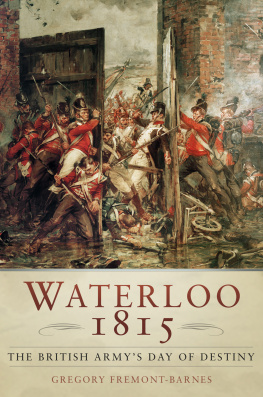Contents
Guide
About the Author
Gregory Fremont-Barnes holds a doctorate in Modern History from the University of Oxford and has served as a Senior Lecturer in War Studies at the Royal Military Academy, Sandhurst. A prolific author, his other books on this period include The French Revolutionary Wars, The Peninsular War, 180714, The Fall of the French Empire, 181315, Nile 1798 and Trafalgar 1805. He also edited Armies of the Napoleonic Wars and the three-volume Encyclopedia of the French Revolutionary and Napoleonic Wars. As an academic advisor, Dr Fremont-Barnes has accompanied several groups of British Army officers and senior NCOs in their visits to the battlefields of the Peninsula and to Waterloo. In addition to the Napoleonic period, he specialises in the study of insurgency and counter-insurgency, his wider work for the UK Ministry of Defence on these subjects regularly taking him to Africa, the Middle East and South America.

Front cover illustration: Lieutenant Colonel James Macdonell with a party of Coldstream and 3rd Foot Guards shutting the North Gate of Hougoumont, by Robert Gibb. (National War Museum, Edinburgh Castle)
First published 2014
This edition first published 2022
The History Press
97 St Georges Place, Cheltenham,
Gloucestershire, GL50 3QB
www.thehistorypress.co.uk
Gregory Fremont-Barnes, 2014, 2022
The right of Gregory Fremont-Barnes to be identified as the Author of this work has been asserted in accordance with the Copyright, Designs and Patents Act 1988.
All rights reserved. No part of this book may be reprinted or reproduced or utilised in any form or by any electronic, mechanical or other means, now known or hereafter invented, including photocopying and recording, or in any information storage or retrieval system, without the permission in writing from the Publishers.
British Library Cataloguing in Publication Data.
A catalogue record for this book is available from the British Library.
ISBN 978 0 75095 785 4
Typesetting and origination by The History Press
Printed and bound in Great Britain by TJ Books Limited, Padstow, Cornwall.
eBook converted by Geethik Technologies

CONTENTS
TIMELINE
The French Revolutionary and Napoleonic Wars
20 April 1792: | France declares war on Austria, thereby initiating the Revolutionary Wars. |
1 February 1793: | France declares war on Britain and Holland. In the course of the coming months the Allies form the First Coalition. |
5 April 1795: | By the Treaty of Basle, Prussia leaves the First Coalition. |
17 October 1797: | France and Austria conclude the Treaty of Campo Formio, effectively ending all continental resistance to Revolutionary France and marking the end of the Second Coalition. |
25 March 1802: | Britain concludes the Treaty of Amiens with France, ending the Revolutionary Wars. |
18 May 1803: | After a brief hiatus, hostilities between Britain and France resume, so marking the beginning of the Napoleonic Wars. |
11 April 1805: | Russia and Britain conclude an alliance, later joined by Austria (9 August) and Sweden (3 October), which results in the formation of the Third Coalition. |
21 October 1805: | Vice Admiral Nelson decisively defeats the Franco-Spanish fleet under Villeneuve. |
2 December 1805: | Napoleon decisively defeats combined Austro-Russian Army at Austerlitz, thereby destroying the Third Coalition. |
14 October 1806: | The French decisively defeat the Prussians in the twin battles of Jena and Auerstdt. |
79 July 1807: | France, Prussia and Russia conclude the Treaties of Tilsit, effectively acknowledging Napoleons extensive dominion west of the River Niemen. |
14 July 1807: | The Battle of Friedland, fought in East Prussia, puts paid to the last vestiges of Prussian as well as, more importantly, Russian resistance to French control of most of the European mainland. |
2 May 1808: | A popular uprising in Spain marks the beginning of open resistance throughout Iberia against French control. |
1 August 1808: | Forces under Sir Arthur Wellesley (the future Duke of Wellington) land in Portugal, marking the beginning of British participation in the Peninsular War. |
56 July 1809: | Battle of Wagram, the decisive battle of Napoleons campaign against a resurgent Austria, which concludes peace on 14 October at Schnbrunn. |
22 June 1812: | Napoleon leads the Grande Arme of over half a million men into Russia. |
22 July 1812: | Wellington defeats the French at Salamanca in central Spain opening the way for a major Anglo-Portuguese offensive to clear Iberia. |
19 October 1812: | Having failed to bring the Russians to terms, Napoleon abandons Moscow and begins to retreat west, with disastrous consequences. |
21 June 1813: | At Vitoria, Wellington inflicts a decisive defeat on the main French Army in Spain. |
1619 October 1813: | A colossal Allied force consisting of Austrians, Prussians, Russians and Swedes decisively defeats Napoleons army at Leipzig, in Saxony, forcing it to abandon Germany and cross back into France. |
6 April 1814: | After failing to hold back the Allies in a remarkable but ultimately unsuccessful campaign on home soil, Napoleon abdicates. |
30 April 1814: | (First) Treaty of Paris concluded between France and the Allies. |
1 November 1814: | The Congress of Vienna convenes to redraw the map of Europe after a generation of war led to the abolition of some states, the creation of others and the shifting of the frontiers of practically all the rest. |
26 February 1815: | Napoleon leaves exile on Elba for France. |
1 March 1815: | Napoleon lands on the south coast of France. |
19 March 1815: | King Louis XVIII leaves Paris for the safety of Ghent in Belgium. |
20 March 1815: | Napoleon arrives in Paris and returns to power, marking the beginning of his Hundred Days. |
25 March 1815: | The Allies declare Napoleon an outlaw and form the Seventh Coalition. |
16 June 1815: | Battles of Ligny and Quatre Bras. |
18 June 1815: | Battles of Waterloo and Wavre. |


![Gregory Fremont-Barnes - A History of Counterinsurgency [2 volumes]](/uploads/posts/book/74652/thumbs/gregory-fremont-barnes-a-history-of.jpg)














